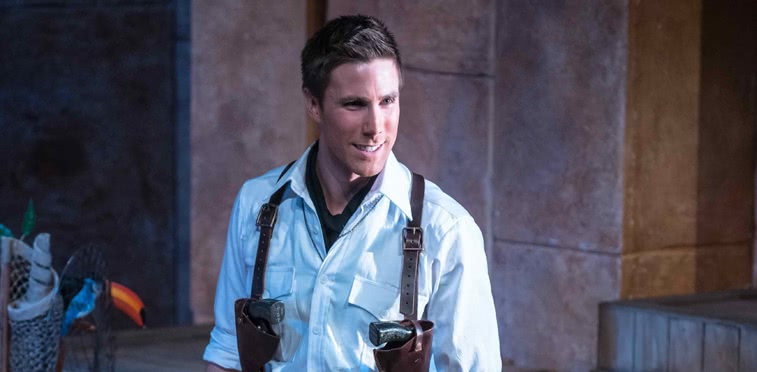Opera and film aficionados alike are bound to be excited by Opera Australia’s latest production ofThe Magic Flute, which is hitting Parramatta’s Riverside Theatre. Mozart’s classic quest for wisdom and true love has been injected with cinematic inspiration from the likes ofIndiana JonesandThe Mummy. Director Michael Gow is enthusiastic about the production, and believes that audiences will be swept up in by the magic of Egypt – which is whereThe Magic Fluteall began.
“We started with that fascination with Ancient Egypt, which was partly what informed the writing of the opera in the first place in 1790,” Gow explains. “Mozart was a Freemason and Freemasonry was influenced by Egyptian images and symbols.”
When it came to the adaptation, the director says, “We thought about something that was a bit more contemporary in the audience’s experience, but keeping the Egyptian theme and all of the themes of the piece – a hero on a quest and someone trying to uncover a secret.”
Although the publicity for the opera points to Indiana Jones as its primary inspiration, Gow begs to differ. “What really inspired it was the Brendan Fraser ’90s movie The Mummy,” he explains. “Everyone says Indiana Jones, but Tamino’s costume is actually [based on] Brendan Fraser’s … There’s a lot of that stuff in there; a whole world of trying to find a sacred statue and pyramids full of sliding panels and secret doors.”
One of the greatest aspects of the production is its versatility. Despite being an opera, it can be enjoyed by people of all ages. “Everywhere [The Magic Flute] goes there’s a chorus of children, and we found that to be an interesting connection for the whole audience,” says Gow. “Those in the know will get the symbols, the quest, seeking the truth and all those things, and the kids will just think that the whole Egyptian aspect and the mummy is amazing and cool. I think what kids love more than anything is dinosaurs and mummies.”
Perhaps because of the archeological and cinematic inspirations, this production of The Magic Flute is set in the 1930s. Despite the contextual changes, Gow assures us that he hasn’t made any significant alterations to the storyline. “The original version is partly fairy story. So you always have to find a kind of context for the show that lets it speak. Once we’d nailed that in the [1930s] context, it just came alive for us.”
This change in setting will also be particularly exciting for costume enthusiasts. “Audiences do have an expectation when they go to the opera that there’s going to be a certain level of excitement and glamour,” says Gow. “It was within our touring budget and our means to give them that kind of visual stimulus, as well as the great music and story. As well as being a very flattering period for men and women … they’re quite simple costumes. Easily cleaned and tourable.”
It’s not all about practicality, though. “The Queen of the Night has a pretty knock-’em-dead outfit. It gets gasps when she makes her first entrance.”
Importantly, Gow’s adaptation has bridged the gap between traditional opera, which is often seen as inaccessible, and modern audiences. “There’s this myth that opera is full of ridiculous stories that make no sense and it’s all just an excuse for great singing. I did the libretto as well, so it’s satisfying when people come up after and say, ‘I actually followed the story and understood it.’”
The Magic Flute is playing atRiverside Theatre, Parramatta onMonday August 4 and Tuesday August 5, tickets available online.


































